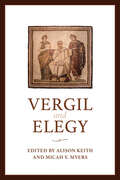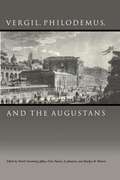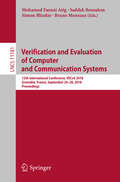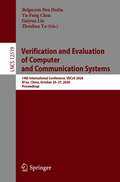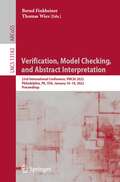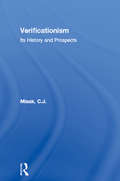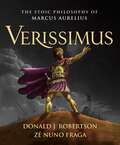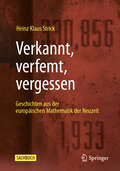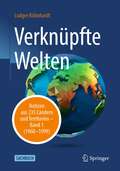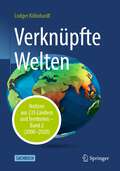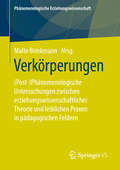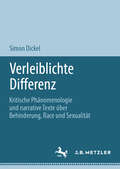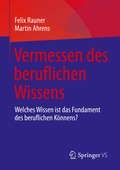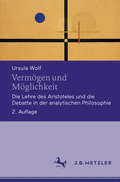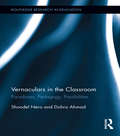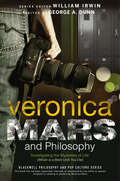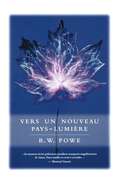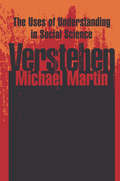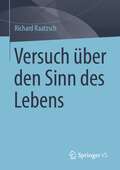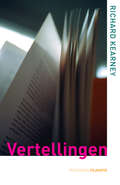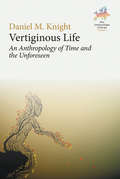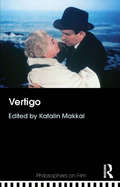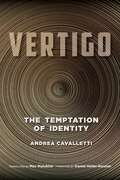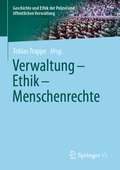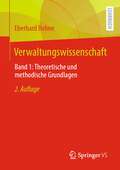- Table View
- List View
Vergil and Elegy (Phoenix Supplementary Volumes #60)
by Alison Keith Micah Y. MyersBorn in 70 BCE, the Roman poet Vergil came of age during a period of literary experimentalism among Latin authors. These authors introduced new Greek verse forms and metres into the existing repertoire of Latin poetic genres and measures, foremost among them being elegy, a genre that the ancients thought originated in funeral lament, but which in classical Rome became first-person poetry about the poet-lover’s amatory vicissitudes. Despite the influence of notable elegists on Vergil’s early poetry, his critics have rarely paid attention to his engagement with the genre across his body of work. This collection is devoted to an exploration of Vergil’s multifaceted relations with elegy. Contributors shed light on Vergil’s interactions with the genre and its practitioners across classical, medieval, and early modern periods. The book investigates Vergil’s hexameter poetry in relation to contemporary Latin elegy by Gallus, Tibullus, and Propertius, and the subsequent reception of Vergil’s radical combination of epic with elegy by later Latin and Italian authors. Filling a striking gap in the scholarship, Vergil and Elegy illuminates the famous poet’s wide-ranging engagement with the genre of elegy across his oeuvre.
Vergil, Philodemus, and the Augustans
by Jeffrey Fish David ArmstrongThe Epicurean teacher and poet Philodemus of Gadara (c. 110-c. 40/35 BC) exercised significant literary and philosophical influence on Roman writers of the Augustan Age, most notably the poets Vergil and Horace. <P><P>Yet a modern appreciation for Philodemus' place in Roman intellectual history has had to wait on the decipherment of the charred remains of Philodemus' library, which was buried in Herculaneum by the eruption of Vesuvius in 79 AD. As improved texts and translations of Philodemus' writings have become available since the 1970s, scholars have taken a keen interest in his relations with leading Latin poets.
Verification and Evaluation of Computer and Communication Systems: 12th International Conference, VECoS 2018, Grenoble, France, September 26–28, 2018, Proceedings (Lecture Notes in Computer Science #11181)
by Mohamed Faouzi Atig Saddek Bensalem Simon Bliudze Bruno MonsuezThis book constitutes the proceedings of the 12th International Conference on Verification and Evaluation of Computer and Communication Systems ( VECoS 2018) held at Grenoble, France, in September 2018. The 11 full papers in this volume, presented together with one abstract and two invited papers, were carefully reviewed and selected from 23 submissions. The aim of the VECoS conference is to bring together researchers and practitioners in the areas of verification, control, performance, and dependability evaluation in order to discuss state of the art and challenges in modern computer and communication systems in which functional and extra-functional properties are strongly interrelated. Thus, the main motivation for VECoS is to encourage the cross-fertilization between various formal verification and evaluation approaches, methods and techniques, and especially those developed for concurrent and distributed hardware/software systems.
Verification and Evaluation of Computer and Communication Systems: 14th International Conference, VECoS 2020, Xi'an, China, October 26–27, 2020, Proceedings (Lecture Notes in Computer Science #12519)
by Yu-Fang Chen Belgacem Ben Hedia Gaiyun Liu Zhenhua YuThis book constitutes the proceedings of the 14th International Conference on Verification and Evaluation of Computer and Communication Systems, VECoS 2020, which was supposed to be held in Xi’an, China, in October 2020, but was held virtually instead. The 19 full papers and 1 short paper presented in this volume were carefully reviewed and selected from 60 submissions. The aim of the VECoS conference is to bring together researchers and practitioners in the areas of verification, control, performance, and dependability evaluation in order to discuss state of the art and challenges in modern computer and communication systems in which functional and extra-functional properties are strongly interrelated. Thus, the main motivation for VECoS is to encourage the cross-fertilization between various formal verification and evaluation approaches, methods and techniques, and especially those developed for concurrent and distributed hardware/software systems. The papers are organized in the following topical sections: petri-net, simulation, and scheduling; formal modeling and verification, testing; and artificial intelligence and machine learning.
Verification, Model Checking, and Abstract Interpretation: 23rd International Conference, VMCAI 2022, Philadelphia, PA, USA, January 16–18, 2022, Proceedings (Lecture Notes in Computer Science #13182)
by Bernd Finkbeiner Thomas WiesThis book constitutes the proceedings of the 23rd International Conference on Verification, Model Checking, and Abstract Interpretation, VMCAI 2022, which took place in Philadelphia, PA, USA, in January 2022.The 22 papers presented in this volume were carefully reviewed from 48 submissions. VMCAI provides a forum for researchers working on verification, model checking, and abstract interpretation and facilitates interaction, cross-fertilization, and advancement of hybrid methods that combine these and related areas.
Verificationism: Its History and Prospects (Philosophical Issues in Science)
by C.J. MisakVerificationism is the first comprehensive history of a concept that dominated philosophy and scientific methodology between the 1930s and the 1960s. The verificationist principle - the concept that a belief with no connection to experience is spurious - is the most sophisticated version of empiricism. More flexible ideas of verification are now being rehabilitated by a number of philosophers.C.J. Misak surveys the precursors, the main proponents and the rehabilitators. Unlike traditional studies, she follows verificationist theory beyond the demise of positivism to examine its reappearance in the work of modern philosophers. Most interestingly, she argues that despite feminism's strenuous opposition to positivism, verificationist thought is at the heart of much of contemporary feminist philosophy.Verificationism is an excellent assessment of a major and influential system of thought.
Verissimus: The Stoic Philosophy of Marcus Aurelius
by Donald J. RobertsonIn the tradition of Logicomix, Donald J. Robertson's Verissimus is a riveting graphic novel on the life and stoic philosophy of Marcus Aurelius.Marcus Aurelius was the last famous Stoic of antiquity but he was also to become the most powerful man in the known world – the Roman emperor. After losing his father at an early age, he threw himself into the study of philosophy. The closest thing history knew to a philosopher-king, yet constant warfare and an accursed plague almost brought his empire to its knees. “Life is warfare”, he wrote, “and a sojourn in foreign land!” One thing alone could save him: philosophy, the love of wisdom!The remarkable story of Marcus Aurelius’ life and philosophical journey is brought to life by philosopher and psychotherapist Donald J. Robertson, in a sweeping historical epic of a graphic novel, based on a close study of the historical evidence, with the stunning full-color artwork of award-winning illustrator Zé Nuno Fraga.
Verkannt, verfemt, vergessen: Geschichten aus der europäischen Mathematik der Neuzeit
by Heinz Klaus StrickSobald Sie sich eingehender mit der Geschichte der Mathematik beschäftigen, werden Sie auch auf Personen stoßen, deren Namen Ihnen bislang unbekannt waren oder von deren Bedeutung für die Entwicklung der Mathematik Sie bisher nichts wussten. Dieses Buch bietet Ihnen einen Einblick in das Leben und Wirken von 67 besonderen Persönlichkeiten aus dem europäischen Raum – und geht bei der Betrachtung der Einzelschicksale jeweils auch der Frage nach, warum diese Personen vergleichsweise unbekannt sind, warum sie regelrecht „vergessen“ wurden. Die Gründe dafür sind vielfältig und meist in den jeweiligen politischen, gesellschaftlichen oder individuellen Lebensumständen zu finden – viele wurden diskriminiert und konnten ihre Fähigkeiten gar nicht erst entfalten, andere waren Ihrer Zeit voraus und blieben lange Zeit unverstanden. Über die historische Einordnung hinaus werden einige der mathematischen Beiträge dieser Personen dargestellt – so ausgewählt, dass sie mit denin der gymnasialen Oberstufe üblicherweise vermittelten Kenntnissen nachvollzogen werden können. Die in diesem Buch enthaltenen Darstellungen beginnen mit Persönlichkeiten aus dem 16. Jahrhundert und schließen somit chronologisch an das Buch Geschichten aus der Mathematik desselben Autors an, sind aber unabhängig davon lesbar. Das Buch richtet sich an alle, die sich für die Entwicklung der Wissenschaften interessieren und dabei insbesondere ein tieferes Verständnis für die menschlichen Aspekte der Mathematik entwickeln möchten.
Verknüpfte Welten: Notizen aus 235 Ländern und Territorien – Band 1 (1960-1999)
by Ludger KühnhardtDie Aufzeichnungen, die Ludger Kühnhardt in 235 Ländern und Territorien der Erde verfasst hat, lassen ein faszinierendes Panorama entstehen, gespiegelt in persönlichen Eindrücken, Begegnungen und Erfahrungen eines in aller Welt tätigen Politikwissenschaftlers und Publizisten. Das Buch rekonstruiert die Verknüpfungen zwischen den Transformationen Europas und dem entstehenden globalen Zeitalter während sechs Jahrzehnten ab 1960 bis zur Schwelle der post-Corona-Welt 2020.
Verknüpfte Welten: Notizen aus 235 Ländern und Territorien – Band 2 (2000-2020)
by Ludger KühnhardtDie Aufzeichnungen, die Ludger Kühnhardt in 235 Ländern und Territorien der Erde verfasst hat, lassen ein faszinierendes Panorama entstehen, gespiegelt in persönlichen Eindrücken, Begegnungen und Erfahrungen eines in aller Welt tätigen Politikwissenschaftlers und Publizisten. Das Buch rekonstruiert die Verknüpfungen zwischen den Transformationen Europas und dem entstehenden globalen Zeitalter während sechs Jahrzehnten ab 1960 bis zur Schwelle der post-Corona-Welt 2020.
Verkörperungen: (Post-)Phänomenologische Untersuchungen zwischen erziehungswissenschaftlicher Theorie und leiblichen Praxen in pädagogischen Feldern (Phänomenologische Erziehungswissenschaft #9)
by Malte BrinkmannIn dem Buch werden praxeologische, poststrukturalistische, hermeneutische, ethnographische und videographische Erkundungen im (post-)phänomenologischen Feld der Pädagogik vorgestellt. Aus sozial-, allgemein-, früh-, heil- und grundschulpädagogischer Perspektive werden Studien zu individuellen, gemeinschaftlichen, habituellen, kommunikativen und stimmungsbezogenen Momenten der Verkörperung präsentiert.
Verleiblichte Differenz: Kritische Phänomenologie und narrative Texte über Behinderung, Race und Sexualität
by Simon DickelDieses Buch untersucht, wie phänomenologische Ansätze zu den Themen Verleiblichung, Wahrnehmung und gelebte Erfahrung innerhalb der Disability Studies, der Critical Race Theory und der Queer Studies diskutiert werden. Auf Grundlage dieser Disziplinen analysiert der Autor Autobiografien und Romane, die sich mit den Folgen von Stigmatisierung und den körperlichen Dimensionen sozialer Ungleichheit auseinandersetzen. Die untersuchten Texte sind Robert F. Murphys The Body Silent, Simi Lintons My Body Politic, Rod Michalkos The Two-in-One: Walking with Smokie, Walking with Blindness, drei autobiografische Texte von Stephen Kuusisto, Vincent O. Carters The Bern Book sowie zwei Romane, Matthew Griffin's Hide und Armistead Maupin's Maybe the Moon. All dieseTexte haben die Bedeutung von Körpergedächtnis und Wahrnehmungsgewohnheiten, den Einfluss von Sprache und Kultur für Prozesse der Verleiblichung, die Bedeutung von Relationalität und Gemeinschaft,die Auswirkungen von Beleidigung und Nichtanerkennung sowie Emanzipation und soziale Anerkennung zum Thema. Folglich werden sie als bahnbrechende Beiträge zur kritischen Phänomenologie diskutiert.
Vermessen des beruflichen Wissens: Welches Wissen ist das Fundament des beruflichen Könnens?
by Felix Rauner Martin AhrensWir zeigen in diesem Buch die Ablösung der am wissenschaftlichen Wissen orientierten fachsystematisch strukturierten akademischen und beruflichen Bildung durch das berufliche Handlungswissen. Dieses Arbeitsprozesswissen ist die Grundlage für die Aneignung der in der Arbeitswelt an Bedeutung zunehmenden Gestaltungskompetenz beruflicher Fachkräfte.Es wird ein modernes, berufspädagogisch begründetes Wissenskonzept entfaltet und dokumentiert. Im ersten Teil des Buches wird das Konzept des beruflichen Wissens entfaltet, im zweiten Teil werden empirische Ergebnisse aus COMET-Projekten dokumentiert, an denen das in unterschiedlichen Berufen vermittelte berufliche Wissen abgelesen werden kann.Es gibt seit Jahrzehnten eine verwirrende Diskussion über das berufliche Wissen. Die KMK hat 1991 mit der Leitidee der beruflichen Gestaltungskompetenz ein neues Konzept für die berufliche Bildung vereinbart. Offen blieb, auf welchem beruflichen Wissen diese neue Leitidee basieren solle. Es fehlte bisher eine originäre berufspädagogische Begründung für das der beruflichen Gestaltungskompetenz zugrunde liegende berufliche Wissen.
Vermögen und Möglichkeit: Die Lehre des Aristoteles und die Debatte in der analytischen Philosophie
by Ursula WolfWährend die griechische Philosophie lange auf das Notwendige als Basis sicherer Erkenntnis fokussiert war, spielen in der Metaphysik des Aristoteles der Begriff des Vermögens und der Möglichkeit eine zentrale Rolle. Der erste Teil des Buchs erläutert die Hintergründe dieser Neuerung und das Zusammenspiel der Begriffe von Vermögen, Möglichkeit und Notwendigkeit bei Aristoteles. Heute hat die Thematik sich weit verzweigt. So gibt es Untersuchungen über epistemische, logische, kausale Möglichkeit und Notwendigkeit sowie über Dispositionen, Fähigkeiten und das Kann der Handlungsfreiheit, wobei diese Forschungen unverbunden nebeneinander stehen. Vor dem Hintergrund der komplexen aristotelischen Theorie wird daher im zweiten Teil des Buchs versucht, die wichtigsten Teilbedeutungen nicht nur als solche zu klären, sondern auch einen systematischen Zusammenhang zwischen ihnen herauszuarbeiten.
Vernaculars in the Classroom: Paradoxes, Pedagogy, Possibilities (Routledge Research in Education)
by Dohra Ahmad Shondel NeroThis book draws on applied linguistics and literary studies to offer concrete means of engaging with vernacular language and literature in secondary and college classrooms. The authors embrace a language-as-resource orientation, countering the popular narrative of vernaculars as problems in schools. The book is divided into two parts, with the first half of the book providing linguistic and pedagogical background, and the second half offering literary case studies for teaching. Part I examines the historical and continued devaluing of vernaculars in schools, incorporating clear, usable explanations of relevant theories. This section also outlines the central myths and paradoxes surrounding vernacular languages and literatures, includes productive ways for teachers to address those myths and paradoxes, and explores challenges and possibilities for vernacular language pedagogy. In Part II, the authors provide pedagogical case studies using literary texts written in vernacular Englishes from around the world. Each chapter examines a vernacular-related topic, and concludes with discussion questions and writing assignments; an appendix contains the poems and short stories discussed, and other teaching resources. The book provides a model of interdisciplinary inquiry that can be beneficial to scholars and practitioners in composition, literature, and applied linguistics, as well as students of all linguistic backgrounds.
Veronica Mars and Philosophy: Investigating the Mysteries of Life (Which is a Bitch Until You Die) (The Blackwell Philosophy and Pop Culture Series)
by William IrwinVeronica Mars is a kick-ass private investigator, smart and street-wise. But what can her character tell us about larger life issues, such as knowledge and skepticism, trust and friendship, revenge, race, gender, and feminism? What makes her tick? And why is Logan such a sarcastic bad boy, anyway? Veronica Mars and Philosophy features a thought-provoking collection of essays centered on philosophical issues brought forth in Veronica Mars, the critically acclaimed neo-noir detective series set in the fictional town of Neptune, California. Fans and newcomers alike will gain unique insights into the philosophical make-up of a hit show that tackled both crime and some of the larger mysteries of life. Introduces significant philosophical concepts that arise in the cult TV show, Veronica Mars Tackles topics relevant to contemporary youth culture, including trust and friendship, revenge, knowledge and skepticism, race, class, gender, and feminism Offers insights into darker themes explored in the series, which is noted for the complexity and intricate plotting of its storylines Delves deeply into the psychology of Veronica Mars during her transition from high school to college Written for fans of the television show, philosophy students or readers interested in popular culture Timed for release with the highly anticipated Veronica Mars feature film
Vers un Pays-Lumiere
by Bruce W. PoweB.W. Powe’s visionary work of political philosophy dares to re-imagine Canada. First conceived in 1993, this fully revised, expanded, updated edition, complete with an inspired new introduction that considers Canada in a post-9/11 context, is a landmark book that has become a classic text for understanding the work-in-progress that is Canada. Countering George Grant’s pessimistic Lament for a Nation, which defined the intellectual climate in Canada for decades, Powe argues that our country is in fact a completely original model of what an enlightened polity might be for the 21st century. Here is a passionately inspired portrait of Canada as a communication state – a counter-nation of loose ties and subtle associations where dialogue, ideas, debate and the exchange of information is the currency that holds us lightly together. Towards a Canada of Light points to the urgent realization of a new and liberating way of what it means to be Canadian.
Verstehen: The Uses of Understanding in the Social Sciences
by Michael MartinIn late nineteenth-century German academic circles, the term verstehen (literally, understanding, or comprehension) came to be associated with the view that social phenomena must be understood from the point of view of the social actor. Advocates of this approach were opposed by positivists who stressed the unity of method between the social and natural sciences and an external, experimental, and quantitative knowledge. Although modified over time, the dispute between positivists and antipositivists--nowadays called naturalists and antinaturalists--has persisted and still defines many debates in the field of philosophy of social sciences. In this volume, Michael Martin offers a critical appraisal of verstehen as a method of verification and discovery as well as a necessary condition for understanding.In its strongest forms, verstehen entails subjectively reliving the experience of the social actor or at least rethinking his or her thoughts, while in its weaker forms it only involves reconstructing the rationale for acting. Martin's opening chapter offers a reconsideration of the debate between the classical verstehen theorists--Wilhelm Dilthey, Max Weber, R.G. Collingwood--and the positivists. Chapters 2 and 3 deal with positivist critiques of verstehen as a method of social scientific verification and understanding. In the subsequent chapters Martin considers contemporary varieties of the verstehen position and argues that they like the classical positions, they conflict with the pluralistic nature of social science. Chapter 4 discusses Peter Winch's and William Dray's variants of verstehen, while chapters 5 through 9 consider recent theorists--Karl Popper, Charles Taylor, Clifford Geertz--whose work can be characterized in verstehenist terms: In his conclusion Martin defines the limitations of the classical and recent verstehen positions and proposes a methodological pluralism in which verstehen is justified pragmatically in terms of the purposes and contexts of inquiry. This volume is the only comprehensive and sustained critique of verstehen theory currently available. It will be of interest to sociologists, philosophers, political scientists, and anthropologists.
Versuch über den Sinn des Lebens
by Richard RaatzschDie Frage nach dem Sinn des Lebens sieht aus wie eine ganz normale Frage, nur ihr Gegenstand scheint von besonderer Wichtigkeit zu sein. Die Wichtigkeit scheint so groß zu sein, die Bedeutung der Frage so tief, dass sie leicht als die eigentliche Frage erscheint. Diese Auffassung ist extrem, und sie trifft sich deshalb mit der Vermutung, dass die Frage nach dem Sinn des Lebens vielleicht gar keine Frage ist. Nur dass es, wenn etwas mit der Frage als solcher nicht stimmt, dann wiederum so aussieht, als ginge mit ihrer Natur als Frage auch das Wichtige an ihr verloren. – Die vorliegende Betrachtung versucht, ausgehend von der Wichtigkeit dessen, worum es in der Frage zu gehen scheint, näher zu bestimmen, in welchem Sinn es sich hier wirklich um eine Frage handelt, und damit auch, in welchem Sinn es hier gerade nicht um eine Frage geht. Die nähere Bestimmung der Natur der Frage entfaltet sich dabei entlang einer Betrachtung verschiedener Antworten, oder eben vermeintlicher Antworten, auf die Frage nach dem Sinn des Lebens. Wenn diese Betrachtung die Natur der Frage tatsächlich erfasst, dann liegt der Nutzen einer Suche nach einer Antwort weder in der Antwort selber, noch in der Suche nach ihr, sondern in der Klarheit, die sich im Verlauf der Suche einstellt.
Vertellingen (Routledge filosofie)
by Richard KearneyVerhalen bieden ons bijzonder veelzijdige en duurzame inzichten in de menselijke conditie en hebben al sinds Aristoteles de aandacht van de filosofie getrokken.Het leidmotief van Vertellingen is dat dit digitale en naar verluidt 'postmoderne' tijdperk niet de ondergang van het verhaal aankondigt, maar juist zelf een bron van nieuwe verhalen vormt.Richard Kearney, filosoof en schrijver, ontrafelt in een heldere en meeslepende stijl waarom verhalen deze uitwerking op ons hebben en betoogt dat het onvertelde leven niet waard is om geleefd te worden.Vertellingen is onmisbaar, voor iedereen die helder wil nadenken over de rol van verhalen in ons leven en onze cultuur.
Vertiginous Life: An Anthropology of Time and the Unforeseen (New Anthropologies of Europe: Perspectives and Provocations #2)
by Daniel M. KnightVertiginous Life provides a theory of the intense temporal disorientation brought about by life in crisis. In the whirlpool of unforeseen social change, people experience confusion as to where and when they belong on timelines of previously unquestioned pasts and futures. Through individual stories from crisis Greece, this book explores the everyday affects of vertigo: nausea, dizziness, breathlessness, the sense of falling, and unknowingness of Self. Being lost in time, caught in the spin-cycle of crisis, people reflect on belonging to modern Europe, neoliberal promises of accumulation, defeated futures, and the existential dilemmas of life held captive in the uncanny elsewhen.
Vertigo (Philosophers on Film)
by Katalin MakkaiReleased in 1958, Vertigo is widely regarded as Alfred Hitchcock’s masterpiece and one of the greatest films of all time. This is the first book devoted to exploring the philosophical aspects of Vertigo. Following an introduction by the editor that places the film in context, each chapter reflects upon Hitchcock’s film from a philosophical perspective. Topics discussed include: memory, loss, memorialisation, and creativity mimetic or representational art and art as magic the nature of romantic love gender, sexual objectification, and identity looking, "the gaze", and voyeurism film and psychoanalysis fantasy, illusion, and reality the phenomenology of colour. Including annotated further reading at the end of each chapter, this collection is essential reading for anyone interested in Vertigo, and an ideal resource for students of film and philosophy.
Vertigo: The Temptation of Identity
by Andrea CavallettiReading philosophy through the lens of Alfred Hitchcock’s Vertigo, Andrea Cavalletti shows why, for two centuries, major philosophers have come to think of vertigo as intrinsically part of philosophy itself.Fear of the void, terror of heights: everyone knows what acrophobia is, and many suffer from it. Before Freud, the so-called “sciences of the mind” reserved a place of honor for vertigo in the domain of mental pathologies. The fear of falling—which is also the fear of giving in to the temptation to let oneself fall—has long been understood as a destabilizing yet intoxicating element without which consciousness itself was inconceivable. Some went so far as to induce it in patients through frightening rotational therapies.In a less cruel but no less radical way, vertigo also staked its claim in philosophy. If Montaigne and Pascal could still consider it a perturbation of reason and a trick of the imagination which had to be subdued, subsequent thinkers stopped considering it an occasional imaginative instability to be overcome. It came, rather, to be seen as intrinsic to reason, such that identity manifests itself as tottering, kinetic, opaque and, indeed, vertiginous.Andrea Cavalletti’s stunning book sets this critique of stable consciousness beside one of Hitchcock’s most famous thrillers, a drama of identity and its abysses. Hitchcock’s brilliant combination of a dolly and a zoom to recreate the effect of falling describes that double movement of “pushing away and bringing closer” which is the habitual condition of the subject and of intersubjectivity. To reach myself, I must see myself from the bottom of the abyss, with the eyes of another. Only then does my “here” flee down there and, from there, attract me.From classical medicine and from the role of imagination in our biopolitical world to the very heart of philosophy, from Hollywood to Heidegger’s “being-toward-death,” Cavalletti brings out the vertiginous nature of identity.
Verwaltung - Ethik - Menschenrechte (Geschichte und Ethik der Polizei und öffentlichen Verwaltung)
by Tobias TrappeTrotz der mitunter eingreifenden Gegenwart von Polizei und Verwaltung im Leben und Alltag der Menschen fehlt es in der Bundesrepublik aktuell an einer Ethik der öffentlichen Verwaltung - anders als im europäischen und internationalen Umfeld. Der Band versucht vor diesem Hintergrund einige konzeptionelle Linien auszuziehen, um eine ethisch-normative Reflexion der Verwaltung einschließlich ihrer menschenrechtlichen Verpflichtungen anzuregen.
Verwaltungswissenschaft: Band 1: Theoretische und methodische Grundlagen
by Eberhard BohneDas Buch bietet eine Einführung in die Verwaltungswissenschaft. Das Buch richtet sich an Studierende aller Fachrichtungen, die sich mit Problemen der öffentlichen Verwaltung befassen, sowie an alle Angehörigen von Verwaltungsberufen innerhalb und außerhalb des öffentlichen Dienstes.
